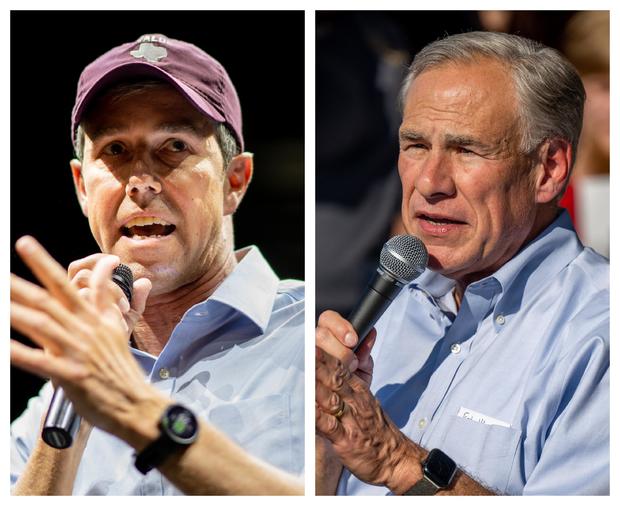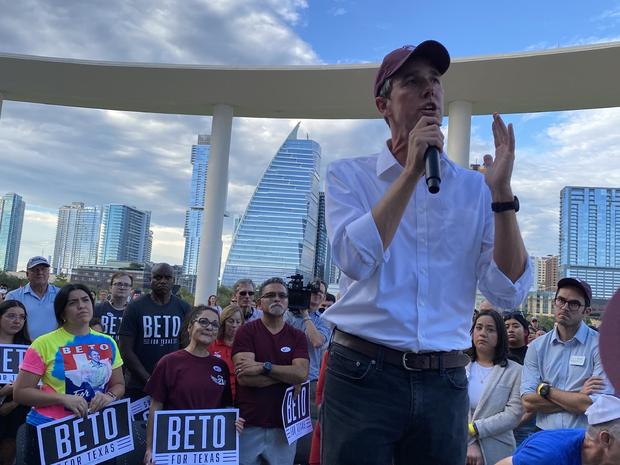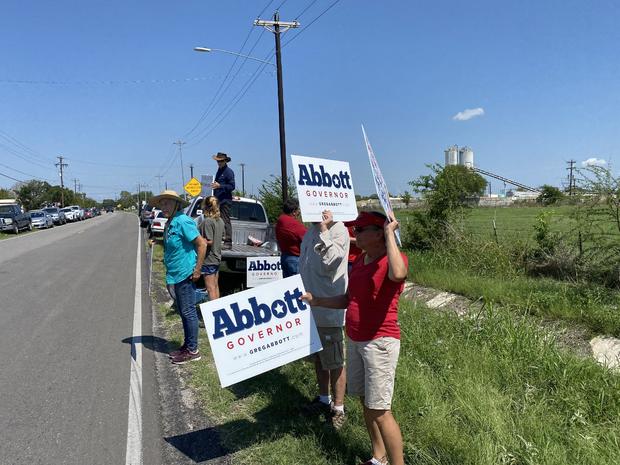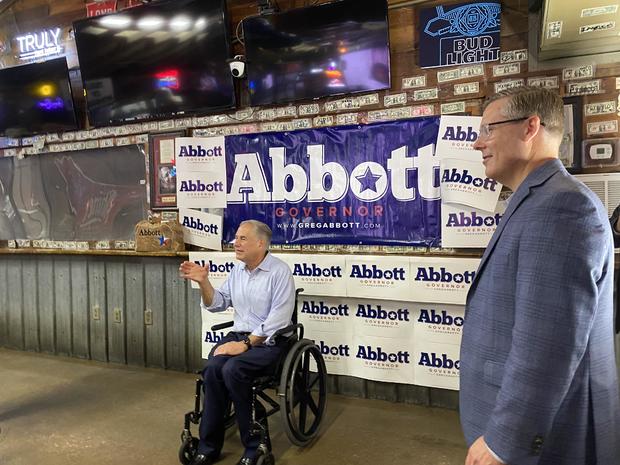Texas’ incumbent Republican Gov. Greg Abbott could be facing his closest Democratic challenger ever, former Rep. Beto O’Rourke, the one-time Democratic star who is risking his second straight election statewide loss in Texas.
Early voting ended Friday, with almost 4.8 million Texans voting before Election Day, far fewer than the nearly 9 million who voted early in 2020, a presidential election year.
Former President Donald Trump, who won the state twice, visited South Texas to help drive up voter participation and campaign for Republicans. He also hit the deep-red 27th Congressional District, although his rally was in Nueces County, which he won twice, but O’Rourke carried it in 2018. Abbott skipped the rally, but Trump lavished praise on him anyway, calling him a “wonderful man” and saying O’Rourke wanted to “abolish guns, God and oil.”
Brandon Bell/Getty Images, Brandon Bell/Getty Images
Abbott is seeking a third term, while O’Rourke, his Democratic challenger,is hoping to become the first Democrat to be elected statewide in Texas since 1994, when George W. Bush won the governor’s race against Ann Richards.
Abbott has opened up a double-digit lead in two recent polls, coming after months of what appeared to be a tightening race. Both O’Rourke and Abbott have raised huge sums of money, with over $100 million raised this year alone.
He was first elected in 2014 by 20 points and won reelection in 2018 by 13 points – the same year as O’Rourke’s failed Senate run. Abbott has been mentioned as a possible presidential contender, too, following in the footsteps of his predecessors, Bush and former Gov. Rick Perry.
Despite his consistent lead in the polls, Abbott hasn’t taken this election lightly, especially given O’Rourke’s strong run for Senate in 2018 and President Joe Biden’s relative success, compared to any Democratic presidential candidate since Bill Clinton in 1996, losing to Trump by under 6 points.
O’Rourke spent the summer traveling the state as part of a “Drive for Texas,” hitting 70 cities over around 50 days. After a brief hiccup at the end – hospitalization and a break from the road – he ended up crisscrossing the state and hitting Republican areas (Alpine in West Texas and Lockhart in central Texas), swing areas (the Rio Grande Valley and the Dallas suburbs), the diverse cities (Houston and San Antonio) and the Democratic heart of Texas, Austin.
Caroline Linton
O’Rourke needs them all to win: Voters of color, Republican Texans to flip, suburban swing voters, youth voters and all the true blue Texas Democrats he can get. He brought out two larger-than-life Texas Democrats, Cecile Richards, the daughter of the late Texas Gov. Ann Richards, and Luci Baines Johnson, the daughter of the late President Lyndon Johnson to campaign with him in Austin.
O’Rourke told CBS News in an interview in September that while he was out on the road, he saw “so many people demanding change – and they’re not typing it out on Twitter, or yelling it at the TV.”
“They’re showing up at our events and then signing up, to go knock on doors and meet voters and win this election so that we can overcome these challenges,” he added. On his social media feeds, O’Rourke often highlights Trump supporters or Republicans who have decided to vote for him – and said in the interview that when he was in El Campo, a Trump supporter asked him to sign a MAGA hat.
But as O’Rourke hit the road this summer to travel to 70 cities throughout the state, at many of his stops, he was greeted by protesters and hecklers. At his last stop of that trip in Lockhart, Texas, at the beginning of September, a group of protesters said they consider themselves the “three Musketeers” who protest O’Rourke.
“He isn’t welcome, especially in Bastrop,” said Monica Carson, the legislative chair of the Lost Pines Republican women and one of the protesters at the Lockhart event. Former President Donald Trump carried Bastrop County by more than 13 points in 2020. “There’s so many people moving here from Democratic states that are trying to turn Texas blue. And us Texans are standing up [against] it.”
In 2018, O’Rourke appealed to donors outside Texas borders, bringing in a record $80 million over the course of the race and eventually landing more than 4 million votes – more than 2 million more than the last Democratic candidate for Senate in the state. But he still fell almost 3 points short of toppling Cruz.
Caroline Linton
It’s been a rocky road since then. O’Rourke launched a presidential bid that first garnered huge attention – a Vanity Fair cover and a then-record-breaking first-day fundraising haul of over $6 million – but he dropped out in Nov. 2019 before any votes were cast after going to the left on guns. Only a month later, the Texas House Democratic Campaign Committee leaked advised candidates not to appear with him, showing his possible vulnerability even in his own state.
Despite his continued strength in the state, Abbott has been preparing for O’Rourke, filling a war chest of $55 million in June 2021, six months before O’Rourke even announced he would be running.
But he has moved further to the right in the past eight years, launching a National Guard mission along the border called Operation Lone Star, loosening gun laws, signing a restrictive abortion law in 2021 – ahead of the Supreme Court decision overturning Roe – and pushing through a voter law that led to Democrats fleeing the state.
Then there was the 2021 Texas freeze, which led to a dayslong power outage throughout most of the state, exposing the state’s shaky power grid. According to a Dec. 2021 report by the Texas Department of Health Services, 246 deaths were blamed on the storm, making it one of the state’s worst natural disasters in history.
The criticism of Abbott’s response to the freeze stood in stark contrast to the praise he received for the response to Hurricane Harvey, which slammed the Gulf Coast with days of rain in 2017. Days after the hurricane hit near Corpus Christi as a Category 4 storm, Abbott elevated a moderate Democrat, Texas A&M University chancellor John Sharp, to lead the newly-formed Governor’s Commission to Rebuild Texas. The state’s top emergency management official praised Abbott as being “24/7” to the Texas Tribune, and Trump praised Abbott when he came down to Corpus shortly after the hurricane hit.
CBS News
When O’Rourke launched his bid for governor, he hit Abbott hard over the grid failure – and continued through a February 2022 storm when Abbott said “no one can guarantee” the power would stay on.
But that slip didn’t compare with what was to come from Abbott. On May 24, an 18-year-old gunman opened fire at an elementary school in Uvalde, Texas, killing 19 children and two teachers before being shot and killed by a Border Patrol officer who responded. At a press conference with local and state officials in Uvalde the day after the shooting, Abbott said the shooting “could have been worse” if not for the response of law enforcement.
In the days and weeks following the shooting, local authorities provided shifting – and often conflicting – accounts of what happened. Abbott was forced to backtrack, said he’d been “misled” about the shooting, and although O’Rourke and other Democrats called for Abbott to call a special session of the Legislature to investigate, Abbott instead convened a committee of three legislators to conduct a probe.
Ahead of the report’s release, surveillance video of the shooting was leaked that showed officers waiting in the hallway for 77 minutes – in some cases, even as the screams of children could be heard. The committee’s report found that 376 law enforcement officers in total responded to the shooting, and said there had been “systemic failures and egregiously poor decision making.”
On May 25, O’Rourke crashed Abbott’s press conference and confronted him over gun laws, telling him “you are doing nothing” and blasted him for not acting after other deadly mass shootings in the state. In typical O’Rourke fashion, the video went viral and led to a fundraising blitz.
A dark money group called “Coulda Been Worse” has taken out millions in advertisements targeting Abbott and other Republicans, including Lt. Gov. Dan Patrick and Attorney General Ken Paxton.
In Austin two weeks after the shooting, Imelda Garza, who said she was a gun owner and a Republican, of nearby Georgetown said she messaged a friend and recalled that after seeing O’Rourke confront Abbott. Garza said she is from South Texas and came from a family of gun owners, but she said the shooting and the response was “outrageous.”
“All he was trying to do was stand up for the children of Texas, and if Texas changes, maybe we can change more states and more hearts,” she said about O’Rourke at the press conference.
It’s the type of voter O’Rourke needs, and he knows it O’Rourke has often touted his forays into the redder parts of the state, even kicking off his road trip this summer in rural Texas, which carried Cruz to victory in 2018 with a more than 50-point advantage.
As he got back on the campaign trail in Laredo at the end of August, O’Rourke said “for us to make up this ground right now, we need you all. It will not be the Democratic party, it will not be the candidates by themselves. It will not be some magical amount of money or mysterious message that we come up with ourselves in a focus group, it is going to be the people of this community, in this room right now, who have been written out of this democracy before.”
One of O’Rourke’s frequent lines on the campaign trail is “it does not matter, no me importa, if you’re a Republican or a Democrat, or an independent” as long as you’re there to listen.
But at one town hall in Mineral Wells, Texas – located about 50 miles from Fort Worth, straddling the border of the red Texas Panhandle – O’Rourke lost his cool on a hecker who laughed as he talked about the Uvalde shooting. “It may be funny to you, motherf*****, but it’s not funny to me,” O’Rourke said as the room erupted in cheers.
O’Rourke told CBS News in the Sept. interview that he feels “bad for them, their candidate won’t show up. They’re never seen Greg Abbott.”
“They’re every bit as important as every other Texan, whether they support me, or oppose me,” O’Rourke said. “And what I’ve often found is that when we invite these protesters in, they’ve got very thoughtful questions, they have concerns that are the same ones, frankly, that I have about the direction of this state.”
Abbott has tried to tie O’Rourke to rising crime and the Biden administration, especially on immigration and the economy. A CBS News poll from June had gas prices, inflation and the economy ranked as the three most important issues to Texans. Immigration and crime were not listed, although Abbott has run ads accusing O’Rourke of supporting the “defund the police” movement.
In April, Abbott started busing migrants from Texas to Washington, D.C., saying he was “going to take the border” to the Biden administration. He followed up by sending migrants to the Democrat-run cities of New York and Chicago. Mayors Muriel Browser of D.C. and Eric Adams of New York have criticized the move, and Adams has alleged Abbott never contacted him before sending migrants to the city.
While O’Rourke has on the trail decried the program as a “stunt,” a majority of Texans support the program, according to a Texas Public Policy poll from Sept. O’Rourke, who represented a border city, El Paso, has not shied away from immigration and has campaigned extensively in South Texas and the Rio Grande Valley.
The two candidates met at what will likely be the only debate on Sept. 30, in the Rio Grande Valley. O’Rourke slammed Abbott on immigration, noting that he’s been in power for eight years and still, “you blame everyone else” for the immigration crisis.
Prior to the debate, a focus group told Nexstar that 40% supported Abbott, 27% backed O’Rourke, and 33% were undecided. After the debate, 50% supported O’Rourke, 43% supported Abbott, and 7% were undecided.



